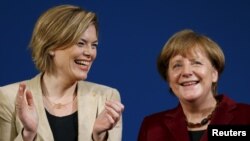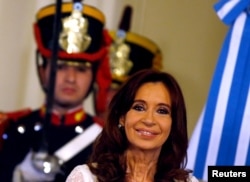As the world marks International Women’s Day, a new report finds females globally wield little political power, hampering efforts to bring about positive social and economic change for women.
The Inter-Parliamentary Union's release of its "Women in Parliament 2015: The Year in Review" report here showed women’s participation in parliament has plateaued for the second year in a row. Last year, the number of female parliamentarians increased by a low 0.5 percent in 58 national elections, to reach 22.6 percent globally.
At this snail’s pace, IPU Director of Programs Kareen Jabre said, women will not reach the 2030 target for equality as set out in the Sustainable Development Goals. In contrast, she said, more progress has been made concerning women parliamentary leaders, with nearly 18 percent of parliaments today being led by women speakers.
Jabre cited the three most recent countries to choose women speakers: Nepal, Namibia and the United Arab Emirates. Nepal "is quite emblematic after the adoption of the constitution in the country," she said. She also noted the UAE "is the first Arab country to have a woman speaker of Parliament."
The report finds Latin America, with more than 27 percent of women in parliament, has made the most progress, with sub-Saharan Africa not far behind. Though a number of African countries' elections have been marred by violence and conflict, the IPU says women members of parliament have increased their numbers by 0.7 percent to reach 23.2 percent.
Jabre said the most progress has been made in Ethiopia and Tanzania due to quotas and other political incentives.
She cited "another interesting initiative" in Africa: "In Benin, we have noticed a very innovative campaign to encourage young women’s political participation through social media.”
As in previous years, Rwanda has the highest proportion of female parliamentarians, with 65 percent of seats held by women.
Overall, quotas remain among the main tools for achieving progress in boosting the number of women MPs, the IPU says, adding they must be quotas with teeth. It says sanctions must be applied and enforced where quota provisions are ignored. Otherwise, it warns, women will not be elected in large numbers.









